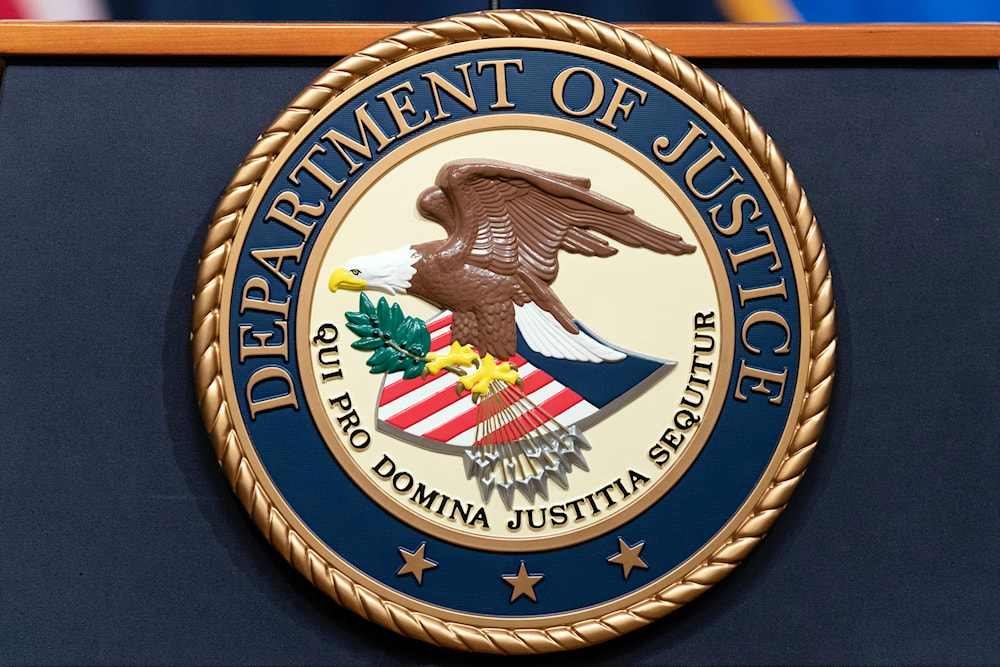Exodus of attorneys jeopardizes DOJ Civil Rights Division
Over 250 attorneys have departed the US Justice Department’s Civil Rights Division under new leadership, triggering a crisis in civil rights enforcement.
-

The Department of Justice seal is seen during a news conference at the DOJ office in Washington, May 16, 2023. (AP)
More than 250 attorneys have exited the US Department of Justice’s Civil Rights Division since January, marking what many insiders describe as an unprecedented crisis.
According to estimates provided to The Guardian by sources familiar with the matter, most of these departures stem from mass resignations, deferred exit offers, or reassignments following a dramatic restructuring of the division under new leadership.
In the division’s civil enforcement sections alone, approximately 235 attorneys have either accepted deferred resignation offers or quit altogether, while an additional 20 have been reassigned to unrelated duties such as handling public records requests or internal complaints.
These sections, considered the operational core of the division, had around 365 attorneys at the start of 2024. By the April 28 deadline for accepting exit offers, that number had dwindled to just over 100.
Harmeet Dhillon's restructuring, political influence
The dramatic exodus coincides with the appointment of Harmeet Dhillon, a close ally of Donald Trump, who assumed leadership of the division in April.
Dhillon has openly articulated her intention to redirect the division’s priorities, focusing on issues such as alleged voter fraud, perceived anti-white discrimination in college admissions, and limiting protections for transgender individuals, objectives that represent a stark departure from the division’s traditional focus.
During an April 26 appearance on a podcast with Glenn Beck, Dhillon stated that she supported the departure of more than 100 attorneys, framing it as a necessary realignment, emphasizing that “the job here is to enforce the federal civil rights laws, not woke ideology."
Later, she took to X to reiterate her stance, stating: “Personnel is policy.”
Justice Department politicized?
Critics argue that these changes reflect a politicization of the Justice Department, with Stacey Young, a former civil rights division attorney and founder of Justice Connection, calling Dhillon’s tone "sadistic" and accusing the leadership of deliberately purging career public servants.
“They made a concerted effort to purge dedicated career civil servants at the Civil Rights Division. And slamming them for leaving is cruel,” she told The Guardian.
Sources inside the department say staff were not simply leaving by choice, they were pushed out. Many were informed that refusal to accept the deferred resignation could result in being laid off. The implicit message says: if attorneys did not align with the administration's policy agenda, they had no future in the division.
Institutional impact, attorney testimonies
The consequences of this civil rights division attorney exodus are already being felt across multiple key enforcement areas. Teams that once included dozens of attorneys working on voting rights, educational access, employment discrimination, and federal compliance have been reduced to skeleton crews.
Some sections, such as the federal coordination and compliance unit responsible for enforcing Title VI protections in federally funded programs, have no remaining permanent attorneys.
Former and current DOJ officials warn that these staffing losses have crippled the division’s ability to enforce the civil rights statutes passed by Congress. “The federal government’s capacity to enforce civil rights protections across voting, education, housing, disability rights, and police accountability have been severely compromised,” said Chirag Bains, a former prosecutor and appointee in the division.
Omar Noureldin, another former appointee, emphasized that institutional knowledge vital in handling complex investigations such as housing discrimination or sexual harassment cannot be replaced overnight.
“This kind of expertise isn’t taught in law school,” he explained. “Without deep experience, lawyers may either pursue weak cases or mishandle winnable ones.”
Even historically nonpartisan career roles may be at risk of politicization, Bains suggested, expressing concern that the administration might attempt to fill these vacant posts with individuals loyal to Trump.
“I fully expect them to hire loyalists into these career roles,” he said. “We’re probably going to see some extremely bad lawyering in the department if that’s what they do.”

 4 Min Read
4 Min Read








